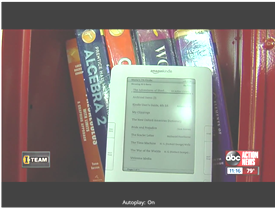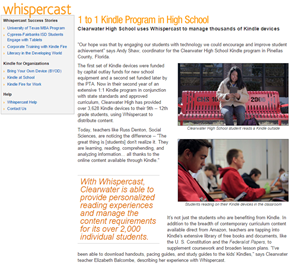 Here’s a story to make any K-12 tech booster weep, if it’s true. A 1,750-student high school in Florida is said to have owned 5,217 Kindles and Fires over the years. But the kids supposedly checked out just 44 of the devices in 2014.
Here’s a story to make any K-12 tech booster weep, if it’s true. A 1,750-student high school in Florida is said to have owned 5,217 Kindles and Fires over the years. But the kids supposedly checked out just 44 of the devices in 2014.
“In 2010,” reports TV station WFTS in Tampa Bay, “Clearwater High School became the first school in the world to buy a new Kindle reading device for each student, believing at the time that Kindles represented the future of education and would replace regular textbooks.
“But five years later, many of these devices still aren’t paid for, even though most are doing little more than gathering dust.
“A slick promotional video produced by Amazon shows smiling young Clearwater High School students using Kindles.
“’What we’ve learned is that students and teachers are telling us they love to read on Kindles,’ Dave Limp, Amazon’s vice president for Kindles says in the video.
“That video was produced in 2012, when Amazon introduced its Whisper Cloud [Whispercast?], a new technology designed to allow schools to more easily support a Kindle network, which offered students limited web access, so they could check assignments, grades and other information using their assigned Kindles.”
I Googled over to a related page on the Amazon site, and sure enough the company still had online material about Clearwater, even if at that point the school owned a mere 3,628 devices.
 But why so many e-readers per student? Well, it seems as if the Kindles had a high breakage rate.
But why so many e-readers per student? Well, it seems as if the Kindles had a high breakage rate.
Supposedly some Clearwater students were even using them as Frisbees. “Kids would…test their durability by throwing them across the school,” the student in the photo to the right says on camera.
Hmm. I wonder about the insurance and storage situations. And why keep around broken Kindles, if that happened? How much of the ownership took place at one time?
At any rate, Clearwater went on to start up a bring-your-own-device program including laptops and cell phones, presumably not used as Frisbees.
Watch the video and tell us if you think the WFTS story is true, or is at least a mixture of facts and almost-facts. If the report is mainly factual, then just what lessons do we have here from the hundreds of thousand dollars spent?
Perhaps we can start with the hardware. E Ink tech at this point is ill-suited for most textbooks. Students can’t move around from place to place within a book nearly as quickly as they can with a tablet. What’s more the six-inch screens would hardly be optimal for viewing detailed illustrations. Simply put, E Ink Kindles are better suited for recreational reading than for textbook use despite major improvements in navigational capabilities. As for the Fires, they probably were seven inch models, hardly the best for textbook use.
Even more importantly, school administrators and planners must worry sufficiently not just about the gizmos and wires and WiFi but also about little trifles like content and proper preparation of teachers and students. As you’ll see from the WFTS video and article, the high school offered some books, but not enough. Especially, it might have done better in the recreational reading department.
Perhaps the Clearwater program started out strong, but if the TV report is accurate, the high school never followed through. Did it show the students movies based on the classics in the Kindles? What about mixing the classics with high-interest books, in line with the recommendations in Readicide, by Kelly Gallagher, a veteran teacher, who emphasizes the need to explain the oldies and work hard to get the students excited about them ?
 And is there a chance the school could start a cell phone book club, centered around the actual interests and needs not just of students but perhaps also of their parents?
And is there a chance the school could start a cell phone book club, centered around the actual interests and needs not just of students but perhaps also of their parents?
Maybe another lesson is to beware of the corporatization of education. How much are we talking about actual education here, as opposed to Amazon marketing?
Interestingly, New York schools have just awarded a $30 million K-12 book-related contract to Amazon, and one hopes that the schools there won’t repeat the mistakes said to have happened in Florida. More encouraging news comes out of Africa, where World Reader’s Kindle efforts in K-12 may be achieving better results. If nothing else, World Reader appears to have paid close attention to such basics as breakage (by way of protective cases) and availability of content (via partnerships with publishers such as Penguin Random House).
Related: Clearwater’s page about the Kindle program. Notice the reference to paving the way for a Bring Your Own Technology Program? Did the school really get its money’s worth in spending hundreds of thousands just to pave the way? Might a small Kindle pilot project have better served Clearwater? But marketing first, right? I’m also curious just why Clearwater spent so lavishly. No accusations of wrongdoing here. But this angle is certainly being investigated in L.A.’s K-12 iPad debacle.
































David, did you fact check the source before you posted?
I ask because there are several glaring errors and inconsistencies that make me question whether this article is accurate.
@Nate: Thanks, but it’s abundantly clear that I myself raised questions about the TV story, from my headline on down. Why would the school keep around broken e-readers, assuming it did? What about the insurance situation? Whatever happened or didn’t, however, the real question in the end is this: How can schools get e-readers (and related devices) right? Actually let’s focus on that right now.
They lost me when they couldn’t spell “college” (collage) or “career” (carrer) correctly in their mission statement.
You’ve touched, rather tangentially, on a topic that intrigues me immensely. I wrestle with one example in Senior Nurse Mentors when I describe how I tried to make sense of why some people, clearly cold-hearted and callous, would choose nursing, a helping profession, then choose a children’s hospital to work at, and then move into nursing administration. It seemed as incongruous as someone who faints at the sight of blood working in an ER. Why do work for which you are so ill-suited?
The reason I was forced to deal with that was that on two occasions, I clashed with just such head nurses when I was trying to help in once case a dying girl abandoned by her family and in the other a boy just diagnosed with leukemia. Why did my efforts to help invoke such fury?
I eventually concluded several things, including:
1. People who go into nursing and find they don’t like caring for sick people move into administration where their dislike get directed at nurses. I also noticed a pattern that failures as nurses often escaped into administration, where they could simply shuffle papers. The result was a tendency for nursing administration to fill up with callous incompetents while those who were skilled, caring nurses remained with patients.
2. People who’re uncaring have the same tendency to go into caring professions such as nursing as con men go where the monied are. They can get away with doing more harm when surrounded by people who have trouble understanding just how callous they are. Many people have trouble grasping just how different from them someone could be.
—–
Education faces a similarly destructive process. Recently, I edited and did layout on a book by someone who’d been on the school board in a major city. One of his criticisms of schools was that school officials are subject to no real vetting process. Get certified as a teacher, and becoming a school administrator is simply going back to school for another year in ed schools where failing out is almost impossible. The result is, like nursing, a lot of people in administration who don’t like teaching, often don’t like teachers, and have no talent for teaching or administration.
—–
There are other factors, of course. In the U.S. school administration lacks prestige and often pays poorly. As a result, it doesn’t attract talent, such as people who know how to use technology in education. They do stupid things, get called out for that, and that furthers the impression that school administration is for losers.
The incompetence of school administrators is well-known in sales. I once interviewed a technology consultant who told me that, when a technology is doomed to fail, such as laser disks in the 1980s, companies hire large numbers of salesmen to dump that technology onto schools and clear out their inventory. The reverse can also be true. School officials can be duped into adopting new and untried technologies, such as this school in Florida apparently did. Note in the picture that those schools seem to have adopted that very expensive first generation Kindle reader. Not test period. No waiting for prices to come down. Just blundering incompetence.
In the end, blunders like this one along with so-called “zero-tolerance” policies illustrate a bumper sticker I once saw: “You can’t fix stupid.” Those smart enough to manage well and adopt appropriate technologies are far better treated in other areas of life. There are few motivations for them to go into school administration.
In Senior Nurse Mentor, I suggest that hospitals create a new nursing specialty whose very purpose is maintaining high nurse morale. I’m not sure that would work with schools. The position would quickly be filled with bureaucrats and incompetent as those they’re supposed to correct. Perhaps the only solution is to give parents quite a bit of choice. Not every parent is smart enough to pick the best schools, but enough are that poor schools, and with them poor administrators, would quickly fall by the wayside.
One of his criticisms of schools was that school officials are subject to no real vetting process. Get certified as a teacher, and becoming a school administrator is simply going back to school for another year in ed schools where failing out is almost impossible.
While it is not difficult to obtain the certification for school administration- go to ed school and pass some easy courses- it is not easy to remain a school administrator. There is a lot of pressure on school administrators to have their schools perform, which results in a lot of turnover- at least where I live.
That being said, the ed schools do a lousy job of training teachers and of training school administrators. Those who succeed at teaching or at school administration do so in spite of- not because of- their ed school training.
The result is, like nursing, a lot of people in administration who don’t like teaching, often don’t like teachers, and have no talent for teaching or administration.
Beginning teachers who are not competent do not get rehired, and leave the profession after several years- or improve. Tenure does not apply to beginning teachers. Nearly half of beginning teachers have left the education profession after 5 years. Many- not all- of those who leave the profession are incompetent.
The incompetent don’t become administrators- they wash out of the profession before the possibility arises of becoming administrators. Those teachers I know who took the school administration path were better than average teachers, with at least five years experience in the classroom. IOW, that a given school administrator had made a dumb decision does not necessarily indicate that a competent, experienced teacher would have made a better decision.
Many of the dumb decisions coming from school administrators are part of the general education culture of the day, rather than from a given administrator. Zero tolerance? That was not the invention of some assistant principal at Podunk High. There tends to be an educational fad theory of the year or of the decade, emanating from the university ed schools, which is promulgated and applied on a wide scale – before there is sufficient or any proof that said educational fad theory works even on a small scale. This nonsense is much larger than a given school administrator. I blame the ed schools, which instead of focusing on what has worked in 2,500 years of formal classroom instruction, keep searching for the next big theory which will explain everything.
Which doesn’t mean that there are not incompetent administrators. I know of one principal whom the school district didn’t rehire after the initial contract term. The principal had proven over the years of the initial contract that “incompetent” was the best description of the principal’s work. What is that former principal doing now? Teaching at the university level. Teaching what? Training school teachers to become administrators. Someone who was not a competent school principal is now training others to become school principals. Oh well.